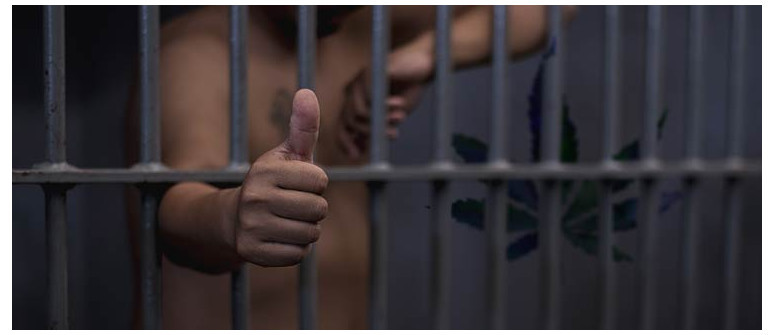Could legalization give new hope to cannabis convicts?

Cannabis prohibition has impacted the lives of thousands of convicts who were charged for committing minor cannabis-related crimes. Now, California and Canada are ushering in new legislation that could reverse some of the damage.
For a long time, the benefits of cannabis legalization have been focused on the economic gain that comes with regulating, selling, and taxing the drug legally. However, there is another very big legal benefit that comes from cannabis too.
As California and Canada move to completely legalize cannabis for recreational use, both governments are looking for ways to help rectify the situation with thousands of people who have been dealt harsh convictions for minor cannabis-related crimes in the past.
So, could cannabis legalization help give new hope to those dealing with cannabis convictions?
CALIFORNIA CLEARS CANNABIS CRIMINAL RECORDS

On January 1st, Cannabis became fully legal in California, the first state to legalize medical weed over 20 years ago. And while Cali wasn’t the first state in the US to usher in recreational weed, the decision is still a big deal.
California has long been considered a leader in the US movement to legalize, and has built the biggest cannabis industry in the US (and one of the biggest in the world).
Now, California has taken things a step further, offering people convicted of minor cannabis-related crimes the opportunity to clear their convictions. Now that cannabis is legal in the state, cannabis convicts across the state can apply for an “expungement” of these crimes from their criminal records.
In San Francisco and San Diego, however, convicts won’t even have to apply. Instead, both counties have vowed to clear minor cannabis convictions automatically from their systems.
In San Francisco, this amounts to roughly 3,000 convictions. San Francisco’s district attorney George Gascon has also said his department will examine a further 4,900 felony cannabis charges to see if they should be reduced to misdemeanors.
In San Diego, the district attorney’s office will downgrade or clear a total of 4,700 cases.
Some cities in California have also offered preference to people with previous cannabis convictions.
Oakland, for example, reserved half of its annual dispensary licenses for “equity applicants,” which includes people convicted of marijuana-related crimes and those living in neighborhoods disproportionately affected by cannabis arrests.
CANADA STILL LOOKING FOR SOLUTIONS

Canada has also vowed to take a similar approach to dealing with people who have been dealt a blow by prohibition.
“Once the law is changed, we will of course reflect on fairness, and what is responsible moving forward,” said Justin Trudeau at a news conference in London, Ontario.[1]
“We know that the current legislation is hurting Canadians and criminalizing Canadians who it perhaps shouldn’t be, but that is an engagement we will take once we have a legalized and controlled regime in place, not before,” he said.
Unfortunately, the process of erasing or editing criminal records in Canada isn’t easy, and Trudeau has been fairly vague about how he plans to act and “reflect on fairness” after cannabis is legalized.
Nonetheless, the issue is at least out in the open in Canada, where it can be discussed until a viable, responsible solution is found.
CAN CANNABIS LEGALIZATION GIVE NEW HOPE TO CONVICTS?
It goes without saying that California’s approach to dealing with cannabis convictions can help restore hope in cannabis users who’ve run in with the law. And it's an approach that could definitely help other parts of the world change their stance on cannabis too.
But like many legislative changes, California’s approach isn’t perfect either.
One of the big downfalls to its approach is that, outside of San Francisco and San Diego, people with cannabis convictions have to apply for expungement with their local district attorney. This means there is a possibility that some expungement cases may not be approved.
The process of applying for expungement is also difficult and can be costly. Hence, unless expungement is done automatically (like in San Francisco and San Diego), it may not be accessible for some people to cover the costs of the process.
Finally, one major downfall to California’s system on dealing with cannabis convictions is this; it doesn’t really result in a “clean record.” Technically, people who get their record expunged are left with a dismissed conviction. While it’s definitely a step in the right direction, it isn’t quite the same as having a clean record.
MOVING BEYOND LEGISLATIVE CHANGE

People who have been affected by prohibition face real struggles. For many, the record of their drug offense has impacted their ability to find employment, housing, apply for government benefits/grants, and much more.
For these people, a clean criminal record literally means a clean slate. In California, people who apply for expungement may have their conviction dismissed, parole lifted or, better yet, prison sentence shortened.
In order to help reduce the damage that prohibition did to so many people, we need to see a huge shift in the way society treats cannabis and cannabis users. It's one thing for legislation to change, but real lasting change comes from society itself.
Once the majority of people begin changing their attitudes towards cannabis is when we’ll see the biggest change. In order for the discrimination toward cannabis users to end, people need to begin treating cannabis like they do cigarettes and alcohol, and accepting that anyone who chooses to use the drug has a right to do so.
.jpg)
.jpg)

.jpg)
